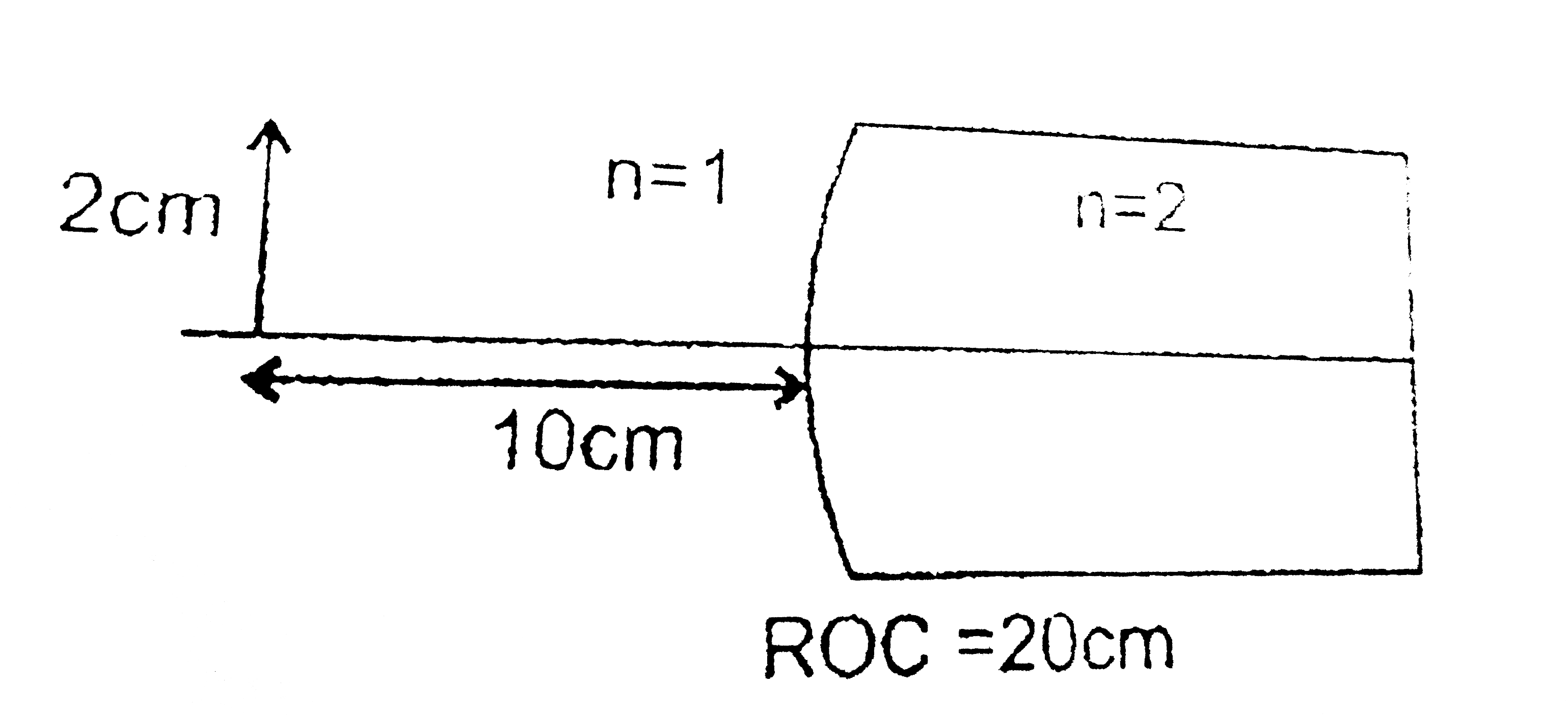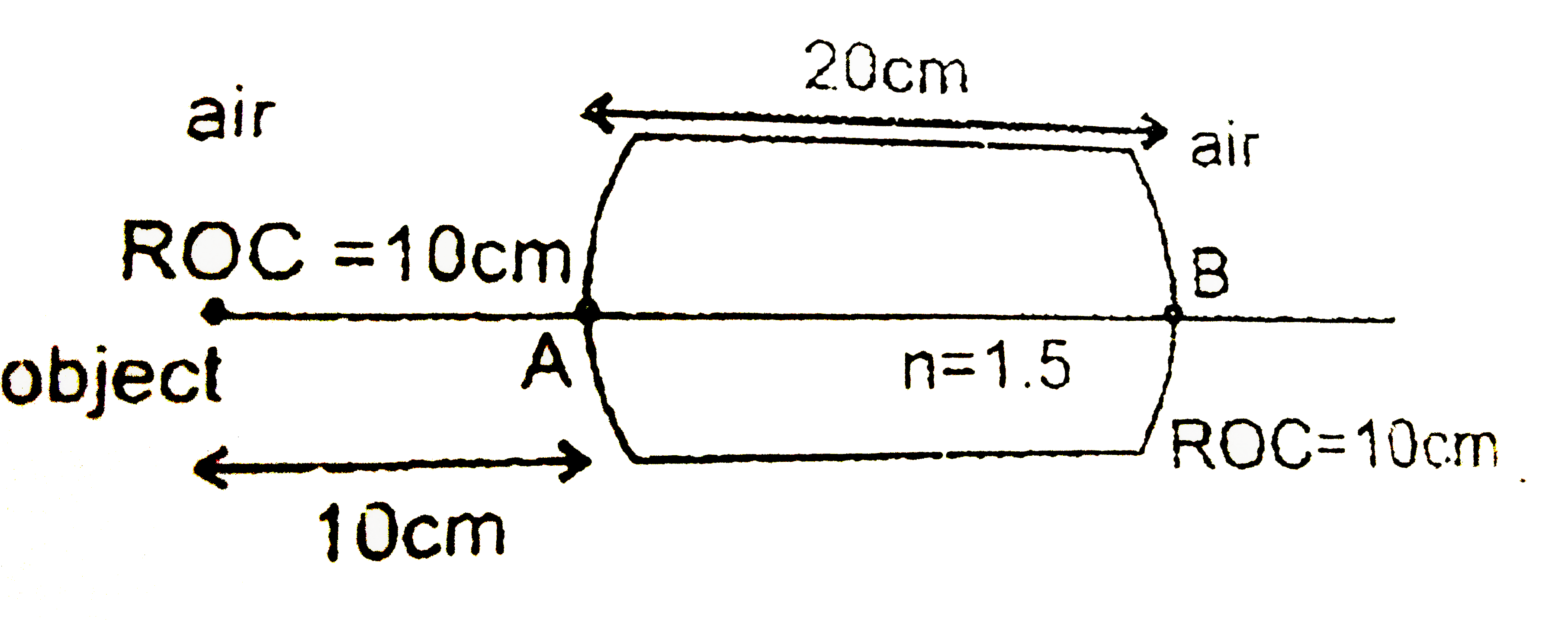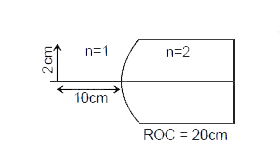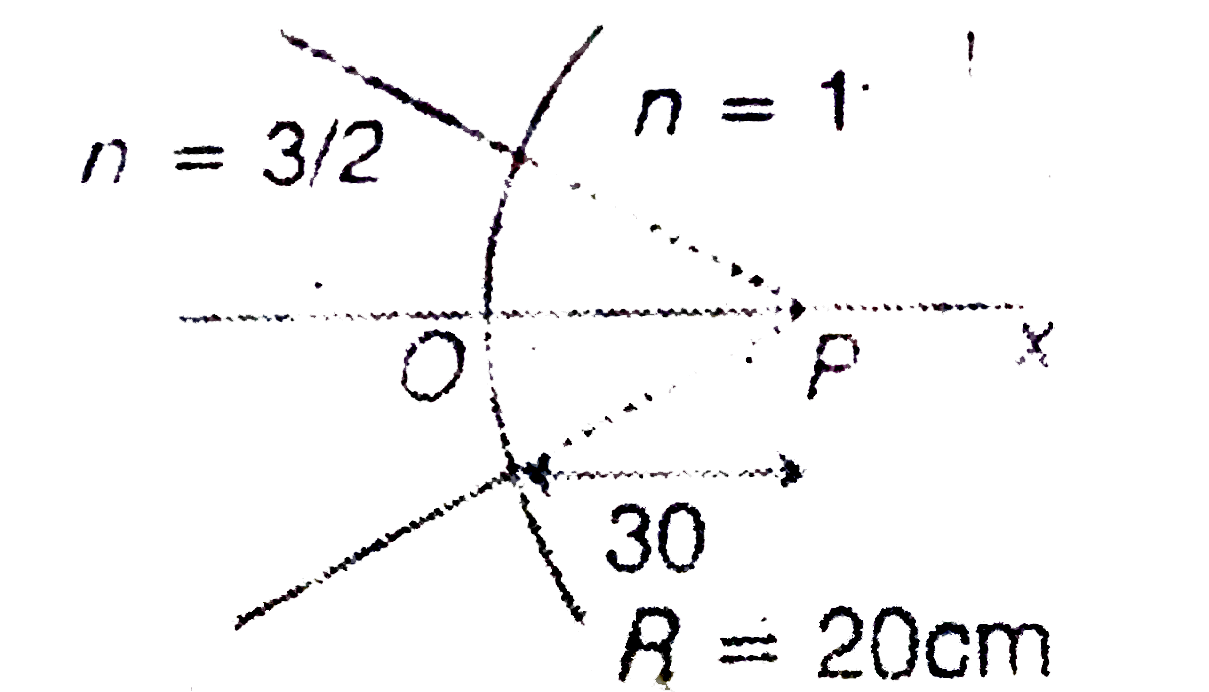An extended object of size is placed at a distance of in air form pole, on the other side of refracting surface has refractive index . Find the positon, nature and size of image formed after single refraction through the curved surface.

The correct Answer is: form pole in the medium of refractive index , virtual erect and in size.
For refraction at spherical surface
. (virtual)
Using magnification formula.
(erect)
Topper's Solved these Questions
- BOOK - RESONANCECHAPTER - GEOMATRICAL OPTICS EXERCISE - Exercise-263videos
GEOMATRICAL OPTICS
- BOOK - RESONANCECHAPTER - GEOMATRICAL OPTICS EXERCISE - Exercise-379videos
GEOMATRICAL OPTICS
- BOOK - RESONANCECHAPTER - GEOMATRICAL OPTICS EXERCISE - Problem33videos
GEOMATRICAL OPTICS
- BOOK - RESONANCECHAPTER - EXPERIMENTAL PHYSICSEXERCISE - PART -II10videos
EXPERIMENTAL PHYSICS
- BOOK - RESONANCECHAPTER - GRAVITATIONEXERCISE - HIGH LEVEL PROBLEMS16videos
GRAVITATION
Similar Questions
An object of size 10cm is placed at a distance of 50cm from a concave mirror of focal length 15cm. Calculate location, size and nature of the image.
View SolutionAn object is placed 10cm away form a glass piecwe (n=1.5) of length 20cm bounded by spherical surfaces of radii of curvaure 10cm. Find the position of final image formed after two refractions at the spherical surfaces.
 View Solution
View Solution
Knowledge Check
- Question 1 - Select One
An extended object of size 2 cm is placed at a distance of 10 cm in air (n = 1) from pole, on the principal axis of a spherical curved surface. The medium on the other side of refracting surface has refractive index n = 2. Find the position, nature and size of image formed after single refraction through the curved surface.
 A30 cm from pole in the medium of refractive index 1, virtual, erect and 4 cm in size.B40 cm from pole in the medium of refractive index 1, virtual, erect and 4 cm in size.C40 cm from pole in the medium of refractive index 1, real, inverted and 4 cm in size.D30 cm from pole in the medium of refractive index 1, virtual, erect and 6 cm in size.
A30 cm from pole in the medium of refractive index 1, virtual, erect and 4 cm in size.B40 cm from pole in the medium of refractive index 1, virtual, erect and 4 cm in size.C40 cm from pole in the medium of refractive index 1, real, inverted and 4 cm in size.D30 cm from pole in the medium of refractive index 1, virtual, erect and 6 cm in size. - Question 2 - Select One
The image for the converging beam after refraction through the curved surface is formed at
 A40 cmB403 cmC20 cmD1807cm
A40 cmB403 cmC20 cmD1807cm - Question 3 - Select One
An object is placed at a distance of 10 cm (in a medium of μ = 1) from the pole of a spherical refracting surface bounding a medium of μ = 1.5. If the image formed is virtual and at a distance of 40 cm, then the spherical surface is –
Aconcave with radius of curvature = 8 cmBconvex with radius of curvature = 8 cmCconcave with radius of curvature = 3.6 cmDconvex with radius of curvature = 3.6 cm
An object of size 2cm is placed at a distance of 40cm from a glass lens, close to the principal axis of the lens, and the lens forms an image of size 2cm. What is the size of the image and what type of image is formed if the lens and the object, in the same arrangement, is immersed into water ? The refractive index of the lens 1.5, and that of the water is 1.33.
View SolutionA convex surface of radiys of curvature 20 cm separates air from glass of refractive index 1.5. Find the position and the nature of the image of a small object placed at 50 cm in front of the convex surface.
View SolutionA small point object is placed atOat a distance of0.60metre in air from a convex spherical surface of refractive index1.5.If the radius of the curvature is 25cmthen what is the position of the image on the principal axis.
View SolutionA point object is placed in air at a distance of 40 cm from a concave refracting surface of refractive index 1.5. If the radius of curvature of the surface is 20 cm, then the position of the image is –
View SolutionA point object is situated at a distance of 36 cm from the centre of the sphere of radius 12 cm and refractive index 1.5. Locate the position of the image due to refraction through sphere.
View Solution

